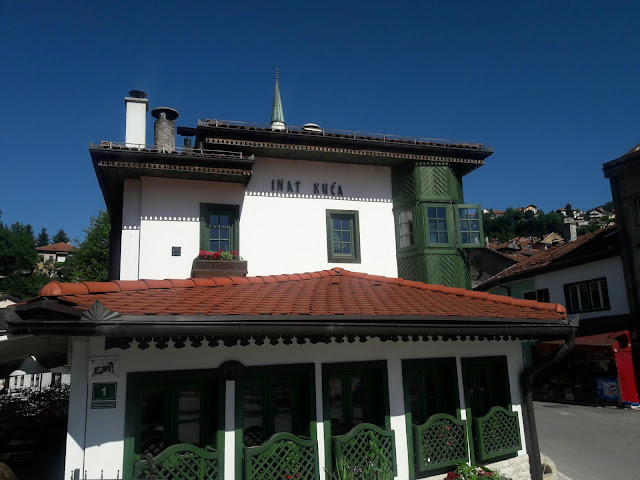Tuesday, July 4, 2017
After a day flight to London yesterday, we had an overnight layover at Heathrow. This morning, we were on to Sarajevo.
After dropping our bags at a small guest house in the center of town, we went for a walk and found the museum related to the Austro-Hungarian era (1878 to 1918). The museum is located at the site where Serbian nationalist (1) Gavrilo Princip assassinated Arch-Duke Franz Ferdinand, which led to World War I (2). The Arch-Duke had survived another assassination attempt earlier in the day in which a bomb was thrown at his car. There were seven different assassins in the crowd that day.
We had a nice walk through the center of the city, seeing churches, mosques, etc. There are still bullet and mortar marks on some of the buildings from the Yugolslav wars (3) in the 1990s, when Sarajevo was under seige for almost 4 years. There are a also few "Sarajevo roses" left in the sidewalks where mortar shells fell during the siege.
(1) Serbs did (and still do) comprise a large portion of the population of Bosnia
(2) Historians do not fully agree how this assassination "ignited the powder keg" and led to war. Franz Fischer's theory goes somethong like this:
a) Germany knew that war was coming eventually, and felt that now was better than later when their enemies might be better prepared. The Germans, with whom Austria-Hungary was allied, therefore pushed Vienna to make exhorbitant demands on Serbia, with which was Russia was allied.
b) The Serbian response to the Austrian demands is deemed unacceptable in Vienna, leading the Austro- Hungarians (and their German allies) to declare war on Serbia.
c) Russia mobilized troops to defend its fellow slavs in Serbia against Austro-Hungary.
d) Germany declared way on Russia.
e) France declared war on Germany and Austro-Hungary due to its alliance with Russia.
f) Germany invaded neutral Belgium to attack France.
g) England declared war on Germany because Germany had violated Belgian neutrality, which England had pledged to respect.
Historians generally agree on b to g. Some historians suggest that officials of various governments believed at the time no one wanted war and that at least one country would step back from the breach before war broke out.
(3) I will not even attempt to explain the wars arising from the dissolution of Yugoslavia. The BBC has a good six part series called "The Death of Yugoslavia" (available on Youtube) that discusses this complex war and includes interviews with many of the principals.






No comments:
Post a Comment